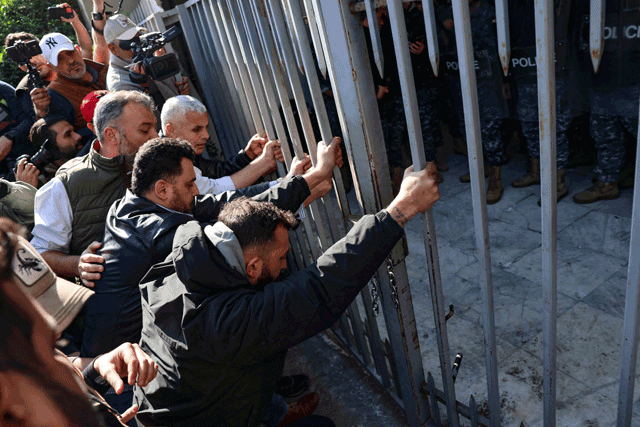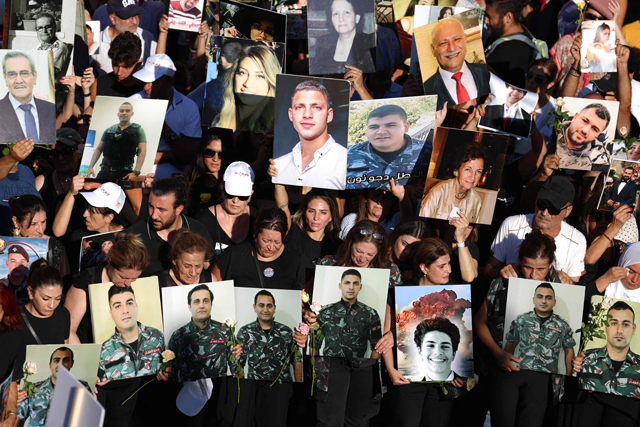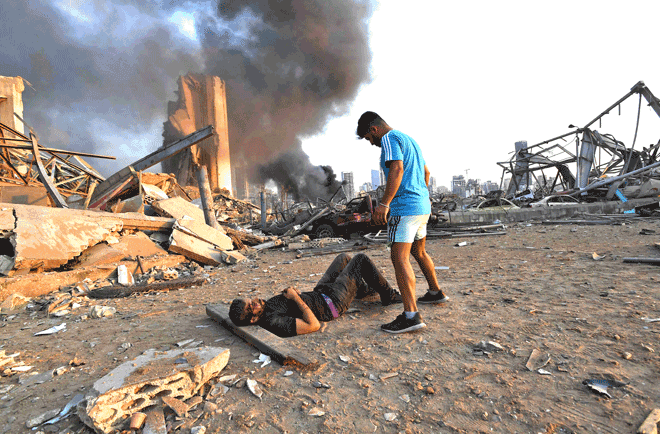You are here
Beirut blast victims' relatives rally for embattled probe judge
By AFP - Jan 26,2023 - Last updated at Jan 26,2023

Relatives of victims of the 2020 Beirut port explosion push against the entrance gate of the palace of justice in the Lebanese capital, during a rally to support the judge investigating the disaster, on Thursday, after he was charged by the country's top prosecutor in the highly political case (AFP photo)
BEIRUT — Families of the victims of the deadly 2020 Beirut port explosion rallied Thursday to support the judge who has resumed work on the politically-charged case in a daring challenge to Lebanon's entrenched ruling elite.
Experts have warned that the battle between investigative judge Tarek Bitar and top prosecutor Ghassan Oueidat, who has charged him with insubordination, will be a critical test for the faltering justice system of the crisis-hit Mediterranean nation.
Bitar this week defied Lebanon's ruling class to charge several powerful figures — including Oueidat, the prosecutor general — in connection to the blast, and revived a probe that was suspended for over a year amid vehement political and legal pushback.
Oueidat in turn charged Bitar for insubordination and for "usurping power", ordered the release of all those detained in the case, and slapped a travel ban on them and the judge.
Bitar was called for questioning on Thursday, a summons he did not attend.
Security was tight at the palace of justice in Beirut, where dozens of family members of the victims gathered "to support the investigation" led by Bitar, some carrying posters of those who died.
"We had faith in justice, but the mask has now fallen," said protester Abdo Matta, 54, who lost his son in the explosion.
"We will never stop, we want to know who killed our children."
One of history's biggest non-nuclear explosions, the August 4, 2020 blast destroyed much of Beirut's port and surrounding areas, killing more than 215 people and injuring over 6,500.
Authorities said hundreds of tonnes of ammonium nitrate fertiliser haphazardly stocked in a port warehouse since 2014 had caught fire, causing the explosion.
'Legal hysteria'
No official has been held accountable, and relatives of the victims and rights groups have blamed the disaster on a political class widely seen as inept.
Lawmaker Melhem Khalaf, who represents 1,400 people affected by the blast, said he will meet Thursday with the justice minister and the chief of the Supreme Judicial Council, which is set to convene later in the day.
Khalaf called on the justice minister to “find solutions” so that the probe can proceed, describing the situation as “judicial and legal hysteria”.
Bitar was forced to suspend his probe for 13 months after a barrage of lawsuits, mainly from politicians he had summoned on charges of negligence.
Lebanon has a history of political assassinations, and authorities are now “entirely responsible for the judge’s safety”, the families warned, referring to the move against him as a “coup d’etat”.
A defiant Bitar told AFP Wednesday he will not step down from this case, adding that the chief prosecutor “has no authority” to intervene.
The judicial arm-wrestling between Bitar and Oueidat risks deepening Lebanon’s mounting woes, and some warn it may be the last nail in the coffin of a notoriously politicised justice system.
“The future of this case is fraught with danger,” said legal expert Paul Morcos.
The complex case is subject to “immense political pressure that Lebanon’s justice system cannot surmount, creating this huge rift”, he added.
The powerful Iran-backed movement Hizbollah has repeatedly called for Bitar’s dismissal, and this week expressed support for Oueidat.
Hizbollah lawmaker Ibrahim Al Moussawi described Oueidat’s decision as “a step in the right direction to restore confidence in judges and the judiciary after it was destroyed by some of its members”.
But Samy Gemayel, a lawmaker opposed to Hizbollah, warned the judicial battle “could lead to the total collapse of the justice system”, and called on citizens to defend Lebanon against “a mafia and an armed militia”.
Among those ordered released by Oueidat were dual American-Lebanese citizen Ziad Al Ouf, who his lawyer Sakher al-Hashem said had already “arrived in the United States, and will not return to Lebanon”.
A judicial official said that the United States had lobbied for his release.
On Wednesday, Human Rights Watch and Amnesty International called on the United Nations Human Rights Council to “urgently pass a resolution to create an impartial fact-finding mission” into the port explosion.
“The Lebanese authorities have repeatedly obstructed the domestic investigation into the explosion,” the joint statement said.
Related Articles
BEIRUT — Lebanon's campaigning judge Tarek Bitar, who is investigating the deadly 2020 Beirut port blast, charged the prosecutor general and
BEIRUT — Lebanon marked three years since one of history's biggest non-nuclear explosions rocked Beirut with hundreds of protesters marching
BEIRUT — The Lebanese judge investigating the deadly 2020 Beirut port blast has resumed his work, a judicial official said Monday, after a 1















